| Christopher Ferrara | |
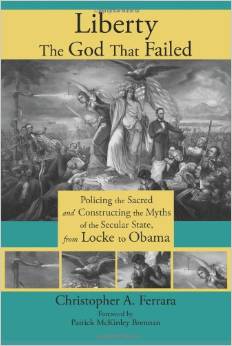
|
Liberty, the God That Failed: Policing the Sacred and Constructing the Myths of the Secular State, from Locke to Obama What has gone wrong with the grand American experiment in "ordered liberty"? The progressive answer is that America has failed to live up to its full promise of inclusiveness and equality--likely the result of corporate greed and white male ruling elites. The mainstream conservative or libertarian's reply points to the Warren Court, the 1960's, or a loss of Constitutional rectitude. Christopher Ferrara, in Liberty, the God That Failed, offers an entirely different answer. In a counter-narrative of unique power and scope, he unmasks the order promised as a sham; the liberty guaranteed, a chimera. In his telling, the false god of a new political order--Liberty--was born in thought long before America's founding, and gained increasing devotion as it slowly amassed power during the first century of the nation's existence. Today it reveals its full might, as we bear the weight of its oppressive decrees, and experience the emptiness of the secular order it imposes upon us.
Ferrara destroys multiple myths constructed by the secular state with a relentless uncovering of truths hidden by both liberal and conservative/libertarian accounts of what has gone wrong. In this brilliant retelling of American history and political life, the author asks us to open our eyes to harsh realities, but also to the possibilities for a rightly ordered society and the true liberty that can still be ours. Reviews
|
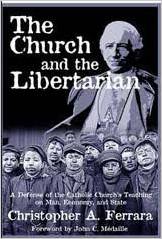
|
The Church and the Libertarian: A Defense of the Catholic Church's Teaching on Man, Economy, and State (2010) Ferrara explores the question: Can one be a faithful Catholic and a "laissez-faire" libertarian? He warns against Catholic acceptance of yet another version of "More Better Liberalism," when it is Liberalism, both political and economic, that has destroyed Christian civilization and brought the entire Western world to the brink of total ruin.
Related
Reviews
|
| Samuel Gregg | |
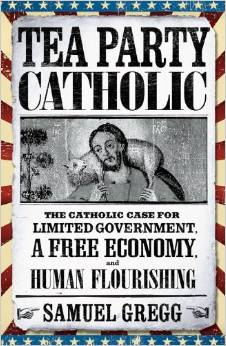
|
Tea Party Catholic: The Catholic Case for Limited Government, a Free Economy, and Human Flourishing (2013) Over the past fifty years, increasing numbers of American Catholics have abandoned the economic positions associated with Franklin Roosevelt’s New Deal and chosen to embrace the principles of economic freedom and limited government: ideals upheld by Ronald Reagan and the Tea Party movement but also deeply rooted in the American Founding. This shift, alongside America’s growing polarization around economic questions, has generated fierce debates among Catholic Americans in recent years. Can a believing Catholic support free markets? Does the Catholic social justice commitment translate directly into big government? Do limited government Catholic Americans have something unique to contribute to the Church’s thinking about the economic challenges confronting all Catholics around the globe?
In Tea Party Catholic, Samuel Gregg draws upon Catholic teaching, natural law theory, and the thought of the only Catholic Signer of America’s Declaration of Independence, Charles Carroll of Carrollton—the first “Tea Party Catholic”—to develop a Catholic case for the values and institutions associated with the free economy, limited government, and America’s experiment in ordered liberty. Beginning with the nature of freedom and human flourishing, Gregg underscores the moral and economic benefits of business and markets as well as the welfare state’s problems. Gregg then addresses several related issues that divide Catholics in America. These include the demands of social justice, the role of unions, immigration, poverty, and the relationship between secularism and big government. Above all, Gregg underlines how economic freedom’s corrosion in America is undermining the United States’ robust commitment to religious liberty—a principle integral not only to the American Founding and the life of Charles Carroll but also the teaching of the Second Vatican Council. As a creative minority, Gregg argues, limited government Catholics can help transform the wider movement to reground the United States upon the best insights of the American Experiment—and thereby save that Experiment itself. Related
Reviews
|

|
On Ordered Liberty: A Treatise on the Free Society (2003)
On Ordered Liberty goes beyond the liberal and conservative divide, asking its readers to think about the proper ends of human choice and actions in a free society. Beginning with the insights of Alexis de Tocqueville and some natural law sources, author Samuel Gregg suggests that integral law must be distinguished from most contemporary visions of freedom. This requires, he believes, a complete repudiation of utilitarian ideas as incompatable with human nature and further analysis of the basic but often neglected-question: what is man?
Reviews
|
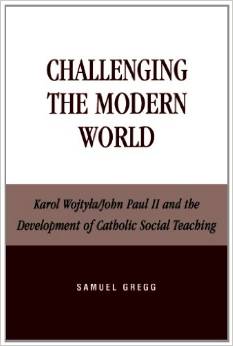
|
Challenging the Modern World: Karol Wojtyla/John Paul II and the Development of Catholic Social Teaching (2003 - Reprint)
Samuel Gregg provides an insightful, cogent, and thorough analysis of the issues surrounding developments in Catholic social teaching during the pontificate of John Paul II. He compares the treatment in John Paul's social encyclicals of three topics-industrial relations, capitalism, and the relations between developed and developing countries-with the handling of these matters in the social teachings of the Second Vatican Council and Paul VI. Through the application of a comparative exegetical approach to the relevant texts, it becomes apparent that John Paul's development of the teaching derives from several sources. Within this analysis, Gregg considers a more specific and less widely examined issue: the extent to which the development in Catholic social thought has been influenced by the writings of Karol Wojtyla before he became pope in 1978. In addition to revealing an openness to certain modern philosophical insights and expressing a range of views about the modern world, these writings elaborate a distinctive anthropology of man as the conscious subject of moral acts. -- Publisher
Reviews
"Book Review: Challenging the Modern World", by Francis T. Hannafey. Theological Studies; Dec2000, Vol. 61 Issue 4, p797. |
| Thaddeus J. Kozinski | |
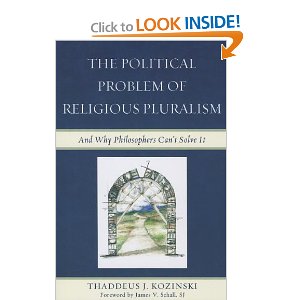
|
The Political Problem of Religious Pluralism: And Why Philosophers Can't Solve It (2013)
In contemporary political philosophy, there is much debate over how to maintain a public order in pluralistic democracies in which citizens hold radically different religious views. The Political Problem of Religious Pluralism deals with this theoretically and practically difficult issue by examining three of the most influential figures of religious pluralism theory: John Rawls, Jacques Maritain, and Alasdair MacIntyre. Drawing on a diverse number of sources, Kozinski addresses the flaws in each philosopher's views and shows that the only philosophically defensible end of any overlapping consensus political order must be the eradication of the ideological pluralism that makes it necessary. In other words, a pluralistic society should have as its primary political aim to create the political conditions for the communal discovery and political establishment of that unifying tradition within which political justice can most effectively be obtained.
Kozinski's analysis, though exhaustive and rigorous, still remains accessible and engaging, even for a reader unversed in the works of Rawls, Maritain, and MacIntyre. Interdisciplinary and multi-thematic in nature, it will appeal to anyone interested in the intersection of religion, politics, and culture. Reviews |
Robert Kraynak |

|
Christian Faith and Modern Democracy: God and Politics in the Fallen World (Frank M. Covey, Jr. Loyola Lectures in Politial Analysis) (2001)
Description (Amazon.com): Do Christianity and modern liberal democracy share a common moral vision, or are they opposed and even hostile to each other? In "Christian Faith and Modern Democracy", Robert Kraynak challenges the commonly accepted view that Christianity is inherently compatible with modern democratic society. Contrary to conventional wisdom, Kraynak argues that there is no necessary connection between Christianity and any form of government and that, in many important respects, Christianity is weakened by its close alliance with contemporary versions of democracy and human rights.
Reviews
Review BrothersJudd.com. Feb. 11, 2002. Ordered Liberty under God, a review of Christian Faith and Modern Democracy, by Douglas C. Minson. The Intercolleciate Review Volume 38, Number 1 — Fall 2002. [.pdf format] Review by Ken Masugi. Religion & Liberty. Nov-Dec 2001. The Acton Institute. Governing by God, by Fr. Robert F. Drinan. America Vol. 185 No. 21, December 24, 2001. Review by Damon Linker. First Things 117 (November 2001): 56-61. Monarchy, Anyone?, by Patrick J. Deneen. Commonweal, Oct 26, 2001. |
| Alasdair MacIntyre) | |

|
Whose Justice? Which Rationality? (1988)
Is there any cause or war worth risking one's life for? How can we determine which actions are vices and which virtues? MacIntyre, professor of philosophy at Vanderbilt University, unravels these and other such questions by linking the concept of justice to what he calls practical rationality. He rejects the grab-what-you-can, utilitarian yardstick adopted by moral relativists. Instead, he argues that four wholly different, incompatible ideas of justiceput forth by Aristotle, Augustine, Aquinas and Humehave helped shape our modern individualistic world. In his unorthodox view, each person seeks the good through an ongoing dialogue with one of these traditions or within Jewish, non-Western or other historical traditions. This weighty sequel to After Virtue (1981) is certain to stir debate. - Publisher's Weekly
Reviews
|

|
After Virtue: A Study in Moral Theory, Third Edition (1981)
Morality, according to Alasdair MacIntyre, is not what it used to be. In the Aristotelian tradition of ancient Greece and medieval Europe, morality enabled the transformation from untutored human nature as it happened to be to human nature as it could be if it realized its telos (fundamental goal). Eventually, belief in Aristotelian teleology waned, leaving the idea of imperfect human nature in conflict with the perfectionist aims of morality. The conflict dooms to failure any attempt to justify the claims of morality, whether based on emotion, such as Hume's was, or on reason, as in the case of Kant. The result is that moral discourse and practice in the contemporary world is hollow: although the language and appearance of morality remains, the substance is no longer there. Disagreements on moral matters appeal to incommensurable values and so are interminable; the only use of moral language is manipulative.
The claims presented in After Virtue are certainly audacious, but the historical erudition and philosophical acuity behind MacIntyre's powerful critique of modern moral philosophy cannot be disregarded. Moreover, independently of its principal claims, the book, first published in 1981, helped to stimulate philosophical work on the virtues, to reinvigorate traditionalist and communitarian thought, and to provoke valuable discussion in the history of moral philosophy. It was so widely discussed that MacIntyre added another chapter to the second edition in order to reply to his critics. After Virtue continues to deserve attention from philosophers, historians, and anyone interested in moral philosophy and its history. -- Glenn Branch Reviews
The Ethical Dance by Peter Sedgewick. Socialist Register 1982, pp.259-267, 1982. Can We Live the Good Life?, by J.M. Cameron. New York Review of Books Volume 28, Number 17 November 5, 1981. |
| Jacques Maritain | |
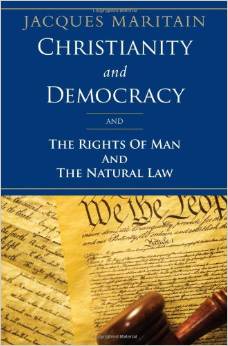
|
Christianity and Democracy, and The Rights of Man and Natural Law Ignatius Press (January 16, 2012). Few political philosophers have laid such stress upon the organic and dynamic characters of human rights, rooted as they are in natural law, as did the great 20th century philosopher, Jacques Maritain. Few Christian scholars have placed such emphasis upon the influence of evangelical inspiration, or of the Gospel message, upon the temporal order as has Maritain.
As this important work reveals, the philosophy of Jacques Maritain on natural law and human rights is complemented by and can only be properly understood in the light of his teaching on Christianity and democracy and their relationship. Maritain shows that Christianity cannot be made subservient to any political form or regime, that democracy is linked to Christianity, and that in order for democracy to thrive, it must reflect certain values historically derived from the Gospel. At the same time he argues his distinctive thesis that personalist or organic democracy provides a fuller measure of freedom and fulfillment and that it emerges or begins to take shape under the inspiration of the Gospel. Even the modern democracies we do in fact have, with all their weaknesses, represent an historic gain for the person and they spring, he urges, from the very Gospel they so wantonly repudiate! |
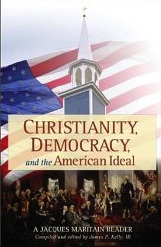
|
Christianity, Democracy, And The American Ideal: A Jacques Maritain Reader Some Americans claim we should exclude Christian values from the public square. On the contrary, argues philosopher Jacques Maritain, good Christians make good citizens.
They live by gospel values: honesty, integrity, and compassion. They obey the law. They resist the selfishness that unbelief and materialism breed. And they subordinate their own interests to the common good. No wonder, says Maritain, that American democracy — which arose from a Christian people — has served so well and lasted so long. Here Maritain shows that in a society unleavened by religious ideals, an enduring democracy can never take root. And once a religious people abandons its faith, even the greatest democracy must wither and die. Untethered from transcendent values, democracy becomes little more than a struggle to be won by the most powerful and the ruthless. The hour is late. Too long have we stood by while politicians promise never to let their religious beliefs influence their political judgments. Too long has a false understanding of democracy cowed us into laying aside our Christian values when we vote As Maritain demonstrates in these lucid pages, Christians are vital to democracy. Good Christians make good citizens, and good citizens make strong democracies. If America and her ideals are to endure, says Maritain, Christians and their values must not be excluded from public discourse, but eagerly welcomed into it. |
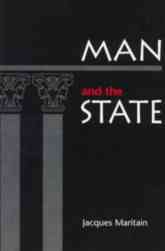
|
Man and the State Catholic University of America Press; New edition edition (February 1, 1998). "Of time-transcending value, this book is probably the most succinct and clearest statement of Thomistic political theory available to the English-language reader. Written during his exile from war-torn Europe, Man and the State is the fruit of Maritain's considerable learning as well as his reflections on his positive American experience and on the failure of regimes he closely encountered on the Continent."
Reviews |
| Fr. John Courtney Murray (1904-1967) | |

|
We Hold These Truths: Catholic Reflections on the American Proposition Rowman & Littlefield Publishers, Inc. (September 2005) The 1960 publication of We Hold These Truths marked a significant event in the history of modern American thought. Since that time, Sheed and Ward has kept the book in print and has published several studies of John Courtney Murray's life and work. We are proud to present a new edition of this classic text, which features a comprehensive introduction by Peter Lawler that places Murray in the context of Catholic and American history and thought while revealing his relevance today.
Book Reviews
|

|
Religious Liberty: Catholic Struggles with Pluralism, by John Courtney Murray and J. Leon Hooper.
Westminster John Knox Press; (June 1993) [From the Publisher:] John Courtney Murray is renowned for his contributions to American ethical debates and well known for his defense of civil religious freedom. He strongly felt that religion should be taught in public schools and universities. Murray had a decisive influence on juridical, political, and social theories. This intriguing volume includes, in addition to two of Murray's most important statements on religious freedom, two essays newly made available to the reading public: one on religious freedom originally suppressed by the Vatican and published here for the first time, and a discussion of human dignity - how it is defined and how it functions as the philosophical foundation of religious freedom - newly translated into English. This fascinating collection will help readers look back at past struggles over religious liberty and forward to dilemmas presently facing the church.
|

|
Bridging the Sacred and the Secular: Selected Writings of John Courtney Murray, edited by J. Leon Hooper.
Georgetown University Press (October 1994) Book Reviews
|

|
The Believer As Citizen: John Courtney Murray in a New Context , by D. Thomas Hughson
Paulist Press (July 1993) [From the Publisher]: In recent years religious leaders of mainline Christian and Jewish groups have been calling on their adherents to play a larger role in the creation of a just social order. One of the most publicized of these was the declaration of the American Catholic bishops, Economic Justice For All. It remains to be seen whether believers raised in an era of affluence are deeply committed to the plight of the needy, and whether religion itself can mark out a path between social activism and conventional party politics. John Courtney Murray (1904-1967) was a pioneer in the ongoing dialogue about the role of believers in public life. For all of his contributions, however, Murray spoke in a patrician manner to a social order that was stable and structured. How useful are his ideas in an age of multiculturalism, when the strongest pressure for justice comes from grassroots organizations of the poor and marginalized? The Believer as Citizen proposes a fresh view of Murray's public philosophy in a way that makes it applicable to today's conditions.
|
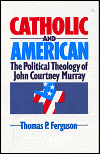
|
Catholic and American: The Political Theology of John Courtney Murray, by Thomas P. Ferguson.
Sheed & Ward (July 1, 1993) |

|
John Courtney Murray and the American Civil Conversation, edited by Robert P. Hunt and Kenneth L. Grasso.
Eerdmans Pub Co (June 1992) Book Reviews
John Courtney Murray and the American Civil Conversation - Review by Neal Fuller The Acton Institute. |

|
The Search for an American Public Theology: The Contribution of John Courtney Murray, by Robert W. McElroy.
Paulist Press (May 1989) [From the Publisher]: A synthesis and critical evaluation of Murray's social writings which argues that Murray's life work still represents the best starting point for public theology in the United States of America.
|
| Richard J. Neuhaus (1936-2009) | |
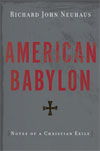
|
American Babylon: Notes of a Christian Exile (2009) Christians are by their nature a people out of place. Their true home is with God; in civic life, they are alien citizens “in but not of the world.” In American Babylon, eminent theologian Richard John Neuhaus examines the particular truth of that ambiguity for Catholics in America today. Neuhaus addresses the essential quandaries of Catholic life—assessing how Catholics can keep their heads above water in the sea of immorality that confronts them in the world, how they can be patriotic even though their true country is not in this world, and how they might reconcile their duties as citizens with their commitment to God. Deeply learned, frequently combative, and always eloquent, American Babylon is Neuhaus’s magnum opus—and will be essential reading for all Christians.
|
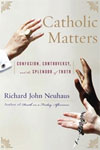
|
Catholic Matters: Confusion, Controversy, And the Splendor of Truth (2007)
Readers acquainted with Neuhaus's previous books and his work with the magazine First Things will be most interested in this latest tome on the state of the Catholic Church. A former Lutheran pastor who became Catholic in 1990 and a priest in 1991, Neuhaus has emerged as a leading voice among those considered to be faithful to the Church's Magisterium, or teaching authority. Here, Neuhaus challenges the oft-heard statement, "Yes, I am a Catholic, but I think for myself," explaining how fidelity to the church begins with thinking for oneself so one can think with the church. He expands on this by exploring the role of conscience, drawing a distinction between doing what one wants and discerning and acting upon the truth. Neuhaus also discusses the church's authority, emphasizing that it is never invoked to require people to believe what is false. Other topics include the eerily prophetic Humanae Vitae, the 1968 papal encyclical on artificial contraception; the loss of Catholic identity when Friday abstinence from meat faded from practice; and how news reporting on the Second Vatican Council shaped its meaning for many American Catholics. Neuhaus devotees and others interested in the issues he raises will find here a thoughtful exposition of Catholicism's present moment. -- Publisher's Weekly.
Reviews
|
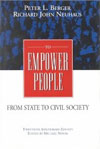
|
To Empower People: From State to Civil Society (1996) - Co-authored with Peter Berger.
In the first edition of this pathbreaking book, the authors showed that such "mediating structures" as family, neighborhood, church, and voluntary and civil associations are crucial institutions, whose weakening spells disaster. They have returned to their original argument to assess today's efforts at renewing civil society.
|
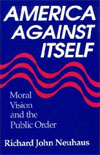
|
America Against Itself: Moral Vision and the Public Order (1992)
An even-tempered (if rather partisan) critique of the American soul as it exhibits itself on the different fronts of our "culture war." Neuhaus (Unsecular America, 1986, eta) traces the traumas of our social and political life back to their ontological roots and supplies a prognosis that will undoubtedly scandalize as many as it sways. A Catholic priest and scholar who presides over the Institute of Religion and Public Life, Neuhaus has concentrated his sociological efforts for some years now on the intersection between the political and the spiritual in American life. In doing so, he has run counter to prevailing notions of secularism - held only, he maintains, by an elite minority - that would, he says, collapse all religious impulses into an entirely private realm. Neuhaus skips over the more obvious examples of conflict - school prayer, Nativity scenes in public parks, etc. - and attempts in more theoretical terms to show that liberal democracy (in its American incarnation) requires a religious foundation if it is to succeed as a unifying social force. He draws on his experiences with the civil-rights movement to show how a religious vocabulary can he used - as it was by Martin Luther King - to bring together even the most mutually antagonistic groups. -- Kirkus Reviews.
|
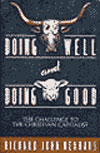
|
Doing Well/doing Good: The Challenge to the Christian Capitalist (1992)
|
|
|
The Catholic Moment: The Paradox of the Church in the Postmodern World (1987)
|
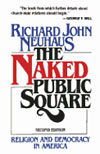
|
The Naked Public Square: Religion and Democracy in America (1986)
Underlying the many crises in American life, writes Richard John Neuhaus, is a crisis of faith. It is not enough that more people should believe or that those who believe should believe more strongly. Rather, the faith of persons and communities must be more compellingly related to the public arena. "The naked public square"—which results from the exclusion of popular values from the public forum—will almost certainly result in the death of democracy. The great challenge, says Neuhaus, is the reconstruction of a public philosophy that can undergird American life and America’s ambiguous place in the world. Arguing that America is now engaged in an historic moment of testing, he draws upon Protestant, Catholic, and Jewish thinkers who have in other moments of testing seen that the stakes are very high—for America, for the promise of democratic freedom elsewhere, and possibly for God’s purpose in the world. An honest analysis of the situation, says Neuhaus, shatters false polarizations between left and right, liberal and conservative. In a democratic culture, the believer’s respect for nonbelievers is not a compromise but a requirement of the believer’s faith. Similarly, the democratic rights of those outside the communities of religious faith can be assured only by the inclusion of religiously-grounded values in the common life. "The Naked Public Square" does not offer yet another partisan program for political of social change. Rather, it offers a deeply disturbing, but finally hopeful, examination of Abraham Lincoln’s century-old question—whether this nation or any nation so conceived and so dedicated can long endure. Reviews
Discussion
|
Michael Novak |
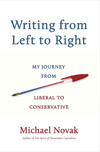 |
Writing from Left to Right: My Journey from Liberal to Conservative Image Books. September 2013. Engagingly, writing as if to old friends and foes, Michael Novak shows how Providence (not deliberate choice) placed him in the middle of many crucial events of his time: a month in wartime Vietnam, the student riots of the 1960s, the Reagan revolution, the collapse of the Berlin Wall, Bill Clinton's welfare reform, and the struggles for human rights in Iraq and Afghanistan. He also spent fascinating days, sometimes longer, with inspiring leaders like Sargent Shriver, Bobby Kennedy, George McGovern, Jack Kemp, Václav Havel, President Reagan, Lady Thatcher, and Pope John Paul II, who helped shape—and reshape—his political views.
Yet through it all, as Novak’s sharply etched memoir shows, his focus on helping the poor and defending universal human rights remained constant; he gradually came to see building small businesses and envy-free democracies as the only realistic way to build free societies. Without economic growth from the bottom up, democracies are not stable. Without protections for liberties of conscience and economic creativity, democracies will fail. Free societies need three liberties in one: economic liberty, political liberty, and liberty of spirit. Novak’s writing throughout is warm, fast paced, and often very beautiful. His narrative power is memorable.
Presentations
|
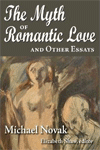 |
The Myth of Romantic Love and Other Essays: 0 Transaction Publishers (February 2013) Written by noted Catholic philosopher Michael Novak, the selections in The Myth of Romantic Love and Other Essays highlight the arc of his intellectual career. Collectively demonstrating the fundamental unity of Novak’s work, the sixteen essays in this book span a broad range of political, economic, and social topics.
The selections offer clarity of thinking for the sake of concrete ends. For example, "The Myth of Romantic Love," the chapter from which the title of this work is drawn, sharply distinguishes the "love" that popular culture portrays from the true Christian vision of love. And "The Family out of Favor" argues, "if things go well with the family, life is worth living; when the family falters, life falls apart." Thus, true Christian love manifest in marriage and family life is a greater resource for civilized society than any other institution. Although this collection shows that Novak’s viewpoints did evolve over time, he remains a thinker that is clearly rooted in the ancient and medieval Catholic tradition. From his discussions of gender relations, to economics, culture, and politics, his perspective honors the primacy of man and his immediate experience, and thereby ultimately glorifies the Creator. Novak’s writing will infuriate some readers, and inspire many others—but both comrades-in-arms and intellectual opponents will find the clarity and intensity of his writings undeniable. |
 |
No One Sees God: The Dark Night of Atheists and Unbelievers March 2006. Surveying the contemporary religious landscape, the division between atheist and believer seems stark. However, having long struggled to understand the purpose of life and the meaning of suffering, Michael Novak finds the reality of spiritual life far different from the rhetorical war presented by bestselling atheists and the defenders of the faith who oppose them.
In No One Sees God, Novak brilliantly recasts the tired debate pitting faith against reason. Both the atheist and the believer experience the same “dark night” in which God’s presence seems absent, he argues, and the conflict between faith and doubt stems not from objective differences, but from divergent attitudes toward the unknown. Drawing from his lifelong passion for philosophy and his personal struggles with belief, he shows that, far from being irrational, the spiritual perspective actually provides the most satisfying answers to the eternal questions of meaning. Faith is a challenge at times, but it nonetheless offers the only fully coherent response to the human experience. Ultimately, No One Sees God< offers believers and unbelievers the opportunity to find common ground by acknowledging the complicated reality of the human struggle with doubt. Novak provides a stirring defense of the Christian worldview, while sidestepping the shrill tone that so often characterizes the discussion of faith, and given the challenges faced in the present age, all who value liberty will find hope in his new way of conversing. Related
|
 |
Washington's God March 2006. Though historians have frequently identified George Washington as a deist rather than a Christian, the Novaks vigorously dispute this characterization. Through careful scrutiny of Washington's religious pronouncements, they establish that the master of Mount Vernon worshipped the God of scripture, not the absentee clockmaker of deism. Like other Christians of his time, Washington recognized the Deity as a living--albeit often inscrutable--influence in his personal life and in the fortunes of his country. Readers even revisit specific events (such as the improbable retreat from New York under cover of a life-saving fog) in which Washington detected the hand of the Almighty. To be sure, the Novaks acknowledge that Washington generally kept his Christian convictions private, but the language and conduct of this Anglican vestryman reflect marks of real devotion, not the mere shell of social conformity. Perhaps more important, we recognize the substance of religious faith informing a military career during which Washington insisted that soldiers attend the sermons of their Christian chaplains and a political career during which he repeatedly summoned the nation to prayers of reverent thanksgiving. Much-needed light on an enigmatic icon. Bryce Christensen (American Library Association)
Reviews
|
 |
The Universal Hunger For Liberty: Why the Clash of Civilizations Is Not Inevitable September 2004. Starting with 9/11 and continuing with the struggle for peace in Iraq, the West has been forced to interact more fully with the civilization of Islam. In The Universal Hunger for Liberty, statesman and award-winning author Michael Novak sets forth a new model for facing this challenge-and for healing a still violently fractured world. In place of ongoing conflict, he offers a surprisingly optimistic vision of how the concept of fundamental human liberty-shared by the Islamic and Judeo-Christian traditions-can heal our cultural, economic, and political differences.
Reviews
|

|
On Two Wings: Humble Faith and Common Sense at the American Founding April 2003 The U.S. isn't officially Christian, but Novak demonstrates that the men who created it rooted the country conceptually in the Bible. The characterizations of God in the Declaration of Independence derive from the Hebrew Scriptures (Old Testament), probably deliberately, because all Christian denominations accepted them. Faith in God was ubiquitous among the founders, who regarded religion as necessary to maintain a just and equitable society. Only a moral (because religious) society would foster responsible citizens; pursuing freedom without religion, individuals would create a chaos of competing self-interests. Finally, the founders' conception of rights derived more from Acquinas than from Enlightenment philosophers. Quoting so often from the founders and their influences that this is practically a documentary history, Novak is compelling on those major propositions and others. He concludes by answering 10 common questions about religion and the founders, and he appends comments on some lesser-known important founders and the Revolution's great fellow traveler, Thomas Paine, who believed in God despite disapproving all the religions he knew. Hard but invaluably informative reading. Ray Olson (American Library Association)
Reviews
|

|
Three in One: Essays on Democratic Capitalism April 2001 Throughout his many writings, Michael Novak, one of the leading Catholic social theorists of our times, has urged us to adopt a tripartite system of democratic capitalism including a market economy, a democratic polity, and a moral-cultural system that would nourish the values and virtues on which free societies depend. "Three in One" introduces the reader to Novak's portrait of democratic capitalism.
|
 |
On Cultivating Liberty: Reflections on Moral Ecology March 1999 On Cultivating Liberty brings together Novak's essays on "moral ecology": the ethos that must be cultivated and preserved if liberal democratic societies are to survive. Novak argues in defense of a free and virtuous society by examing the family, welfare reform, free markets, self-government, and the American Founding, and includes a series of remarkable intellectual studies on figures ranging from Jacques Maritain to St. Thomas Aquinas. Along with a biographical essay and an introduction by Brian C. Anderson, On Cultivating Liberty is indispensable for anyone concerned about the future of democracy.
|

|
Tell Me Why: A Father Answers His Daughter's Questions about God September 1998 This book all started with a fax. As the prolific author of numerous titles (The Spirit of Democratic Capitalism; Business as a Moral Calling; etc.), former politician and theologian Michael Novak is no stranger to answering challenges regarding his faith in relation to the world of politics and philosophy. However, when he receives a lengthy fax from his recent college graduate daughter, Jana, this father's skill in communication is put to the test. Jana Novak, a writer and poet, ponders the deep issues of faith in modern society. She relates questions and concerns to her father through candid, sincere requests for evidence in helping determine what part God and religion will play in her life. The book, written in a Q&A format, allows both Novaks to bring forth fresh insights and beg the reader to consider the difficulties of living out one's faith in a cynical, amoral society. Jana poses her faxed questions by focusing first on the foundations of religion in general. Why, she asks, "Does religion matter?" "Why so many different religions?" "What is God like?" Michael Novak's second series of responses stresses the particulars of religious experience. Jana wonders, "Why is our family Catholic?" "Must I take the Bible literally?" Finally, Jana considers the practicalities of faith. "What is Christian sexual love?" "What about abortion?" and "Do I need to be a Mother Theresa?" Interspersed throughout this dialogue between father and daughter are the writings of C.S. Lewis and other Christian writers who address the struggle between faith and doubt. Although Jana's questions about life, faith and God are often difficult to answer in simple statements, Michael Novak does an excellent job of creating a "learning atmosphere" for his daughter by providing her with a solid foundation of biblical principles and Catholic traditions to contemplate.
Book Reviews
|

|
Business As a Calling: Work and the Examined Life August 1996 In straightforward language, Novak (Belief and Unbelief) sets out to refute the popular conception that business leaders are materialistic and rapacious, asserting that "business not only creates social connections, lifts its participants out of poverty, and builds the foundation of democracy, but also can and must be morally uplifting." His central conceit is that, like the work of priests and ministers, the labors of businessmen and -women are often animated by a sense of calling. Novak cites a 1990 poll that found that after military officers, "more people in business attended church every week than any other elite." While it remains to be proven that the morals espoused in church or temple can and do hold sway on the battlefields of market competition, Novak's meditations should cause those who believe "enlightened capitalism" to be an oxymoron to think twice. (Publisher's Weekly)
|

|
The Fire of Invention: Civil Society and the Future of the Corporation January 1997 Book Reviews
|
 |
Unmeltable Ethnics: Politics and Culture in American Life December 1995 (2nd edition; originally published 1972) |

|
The Catholic Ethic & The Spirit of Capitalism February 1993 Novak declares that Max Weber's 1904 classic The Protestant Ethic and the Spirit of Capitalism missed the mark. In place of Weber's ethos of discipline, hard work and acquisition of wealth, the neoconservative thinker, himself a Roman Catholic, outlines "a Catholic (and catholic) ethic" that stresses the creativity, liberty and responsibility of the individual. Arguing that democratic, pluralistic, capitalist societies are the best hope for ending world poverty and ethnic violence, Novak draws on papal social thought from 1891 to the present in reinterpreting social justice as a personal virtue realized by citizens working cooperatively. He faults U.S. government programs for fostering welfare dependency among the poor urban blacks, and he sets forth an arsenal of reforms, from job training and self-governing public housing projects to measures designed to help the poor build assets. This challenging manifesto will stimulate thinkers at all points on the political spectrum.
|

|
Will it Liberate?: Questions About Liberation Theology July 1991 Book Reviews
|

|
The Spirit of Democratic Capitalism June 1991 Book Reviews
|

|
This Hemisphere of Liberty
November 1990. Book Reviews
|
 |
The Guns of Lattimer |

|
Freedom with Justice: Catholic Social Thought and Liberal Institutions February 1989 [2000 reprint] Book Reviews |
|
Free Persons and the Common Good January 1988 |
|
| David Schindler | |
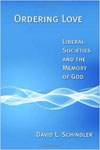
|
Ordering Love: Liberal Societies and the Memory of God (2011)
Reality most basically and properly considered, says David L. Schindler, is an order of love — a gift that finds its objective only in an entire way of life. Love is what first brings things into existence, and everything exists in, through, and for love. With this understanding of reality, Schindler explores how modern culture marginalizes love, regarding it at best as a matter of piety or goodwill rather than as the very stuff that makes our lives and the things of the world real.
Schindler examines how Western civilization’s fixation with technology — especially its displacement of experience with experiment and its privileging of knowing and making — has undermined its capacity to build an authentic human culture. Schindler sees this as a technological age not simply because of technological advancements but because of the way we think as the result of our technological orientation. He shows, within the context of politics, economics, science, and cultural and professional life generally, that God-centered love is what gives things their deepest and most proper order and meaning. Reviews
|

|
Heart of the World, Center of the Church: Communio Ecclesiology, Liberalism, and Liberation (1996)
Today, thirty years after the Second Vatican Council, there can be little doubt that the notion of communion (“communion”) is at the center of Catholicism's renewed understanding of the Church. In Heart of the World, Center of the Church David L. Schindler shows that communion is also at the heart of the Church's worldly mission.
Invoking God's spousal relation to the world, Schindler argues that the Church's answer to the question of worldly freedom is nothing less than its own communio. Yet the claim that the Church promotes the “legitimate automony of earthly realities” by penetrating the world with its own intimate reality is hardly a matter of arcane speculation. Heart of the World, Center of the Church develops its thesis in critical dialogue with Western (especially Anglo-American) liberalism, whose ascendancy especially after the events of 1989 poses a host of urgent questions for the church. Examining liberalism in politics, economics, and the academy, Schindler exposes its inadequate theology of human freedom and “worldly” autonomy, while suggesting how communion both transforms and protects freedom and autonomy in their varied cultural expressions. In the spirit of Pope John Paul II's call for a “new evangelization,” Schindler contributes to what the Pope himself has strongly reaffirmed as “the positive value of an authentic theology of integral human liberation” (Centesimus Annus, 26). Anyone concerned with the problem of nature and grace or with the Church's engagement with culture in a contemporary context will find this book not only a useful resource but also a spur to further reflection. Reviews
See also: Balthasar's Legacy: A Sketch of David L. Schindler's Heart of the World, Center of the Church, by Stephen Joel Garver. |
| Thomas R. Rourke | |
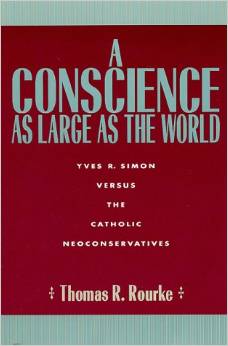
|
A Conscience as Large as the World: Yves R. Simon Versus the Catholic Neoconservatives Among the most influential and controversial developments in twentieth-century American social thought has been the rise of the Catholic neoconservatives, particularly Michael Novak, Richard John Neuhaus, and George Weigel. This important book presents a systematic critique of Catholic neoconservatism using the work of Yves Simon as a theoretical and practical lens of analysis. Rourke demonstrates how Simon, whose works represent the Aristotelian-Thomistic roots of Catholic social thought, and the Catholic neoconservatives address many of the same issues, including democratic government, freedom, practical wisdom, wealth, work, culture, and virtue. Rourke argues, however, that the neoconservative approach to these concepts lacks essential elements of the Thomist tradition, fails to overcome the inadequacies of liberalism and therefore is an inadequate expression of Catholic social thought for our time. Invaluable for students and scholars of political science and religion.
Reviews
|
| Rev. Robert A. Sirico | |
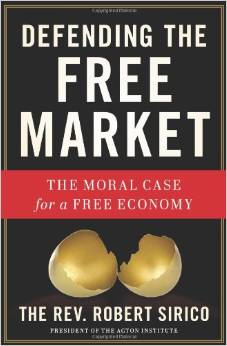
|
Defending the Free Market: The Moral Case for a Free Economy (2012) Consumerism is an appalling spectacle, with Americans glutting themselves on all kinds of excess, while people in the developing world starve. The rich seem to be hogging far more than their share of the world’s resources. Free markets may be efficient, but are they fair? Aren’t there some things—life-saving health care, for example—that we can’t afford to leave to the vicissitudes of the market?
In Defending the Free Market: The Moral Case for a Free Economy, Father Robert Sirico—a Catholic priest, former leftist associate of Jane Fonda, and now a longtime champion of the free market—answers all these objections. Father Sirico shows how a free economy—necessarily including private property, legally enforceable contracts, and prices and interest rates freely agreed to by willing parties to transactions (not set by government bureaucrats)—is the best way to meet society’s material needs, from basic nutrition to sophisticated health care technology. Well-intentioned activists who seek to enlarge the state’s economic role are only killing the goose that laid the golden egg. The fact is, private enterprise in the free market has lifted millions out of dire poverty—far more people than state welfare or private charity have ever rescued from want. But a free economy isn’t just by far the most efficient way of producing the largest amount of goods and services for the world’s population. Economic freedom is also an indispensable support to the other freedoms we prize—such as freedom of speech and freedom of religion. The right to economic freedom doesn’t make things more important than people—just the reverse. It’s only if we have economic rights that we can effectively protect ourselves from government encroachment into the most private areas of our lives—right down to our consciences. As governments across the globe continue to act with unprecedented irresponsibility—burdening the creators of wealth with ever more regulation and borrowing colossal sums of money just as populations are set to decline precipitately—our prosperity, our economic freedom, and our most basic rights are threatened. The comfortable lifestyles and plentiful goods we take for granted are at risk. But so is the liberty whose source is found in our inherent dignity as human beings, endowed by our Creator with unalienable rights. Father Sirico sounds a timely warning—and reveals the principles that must be the basis for the recovery of our freedoms. Related
Reviews
|
| Thomas Storck | |
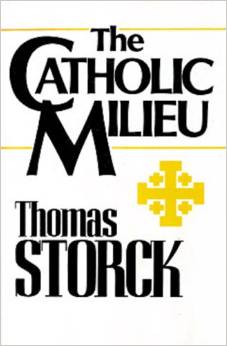
|
The Catholic Milieu Is Catholicism purely an interior set of convictions? In this provocative study, Thomas Storck suggests that a specifically Catholic culture can arise within a secular and pluralistic society. That culture will both challenge and nourish the surrounding society only if Christian truth is incarnated in the manners, customs, and traditions of the community.
|
| Joseph A. Varacalli | |

|
The Catholic Experience in America (The American Religious Experience) (2005) This volume in the American Religious Experience series chronicles the history and present situation of the Catholic Church and the American Catholic subculture in the United States. Catholics have had a long history in America, and they have often had conflicting demands--should they remain loyal to the authority of the pope in Rome, or should they become more accommodating to American culture and society? The Catholic Experience in America combines historical, sociological, philosophical, and theological and religious scholarship to provide the reader with an overview of the general trends of American Catholic history, without over-simplifying the complex nature of that history. |

|
Bright Promise, Failed Community: Catholics and the American Public Order (2000)
In "Bright Promise, Failed Community", respected Catholic sociologist Joseph Varacalli describes how and why Catholic America has essentially failed to shape the American Republic in any significant way. American society has never experienced a "Catholic moment" --the closest it came was during the immediate post-World War II era--nor is it now close to approximating one. Varacalli identifies as the cause of the current situation the "failed community" of Catholic America: an ineffective and dissent-ridden set of organizational arrangements that has not succeeded in adequately communicating the social doctrine of the Church to Catholic Americans or to the key idea-generating sectors of American life. The "bright promise" of Catholic America lies in the long and still developing tradition of social Catholicism. With a revitalized, orthodox, sophisticated community to serve as the carrier of Catholic social doctrine, Varacalli sees trends of thought that would propose viable alternatives to philosophies and ideologies that currently dominate the American public sphere-ones that would thus have a formidable impact on American society.
Reviews
Review by Ken Whitehead. L'Osservatore Romano, (June 26-28, 2000). The Self-Inflicted Wounds of American Catholicism, review by James Likoudis. Catholics United for the Faith. St. Catherine Review Sept./Oct. 2000. Review by James Bemis. CatholicExchange.com. July 4, 2002. The Church That Failed, by Mark Brumley. Catholic Faith March/April 2001. Briefly Noted, First Things 104 (June/July 2000): 76-79. |
| George Weigel | |
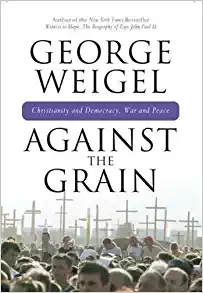
|
Against the Grain: Christianity and Democracy, War and Peace (2008)
Cutting against the grain of conventional wisdom, New York Times bestseller, George Weigel, offers a compelling look at the ways in which Catholic social teaching sheds light on the challenges of peace, the problem of pluralism, the quest for human rights, and the defense of liberty. In this major contribution one of America's most prominent intellectuals offers a meticulous analysis of the foundations of the free society as he makes a powerful case for the role of moral reasoning in meeting the threats to human dignity posed by debonair nihilism, jihadist violence, and the brave new world of manufactured men and women.
|
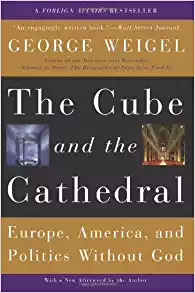
|
The Cube and the Cathedral: Europe, America, and Politics Without God (2005)
Why do Europeans and Americans see the world so differently? Why do Europeans and Americans have such different understandings of democracy in the twenty-first century? Why is Europe dying, demographically? In The Cube and the Cathedral, George Weigel offers a penetrating critique of "Europe's problem" and draws out its lessons for the rest of the democratic world. Contrasting the civilization that produced the starkly modernist "cube" of the Great Arch of La Defense in Paris with the civilization that produced the "cathedral," Notre-Dame, Weigel argues that Europe's embrace of a narrow and cramped secularism has led to a crisis of civilizational morale that is eroding Europe's soul and failing to create the European future. Even as thoughtful Europeans and Americans wrestle with these grave issues, many European political leaders continue to insist-most recently, during the debate over a new European constitution-that only a public square shorn of religiously informed moral argument is safe for human rights and democracy. The most profound question raised by The Cube and the Cathedral is whether there can be any true "politics"-any true deliberation about the common good, and any robust defense of freedom-without God. George Weigel makes a powerful case that the answer is "No"-because, in the final analysis, societies and cultures can only be as great as their spiritual aspirations.
Reviews
See Also:
|

|
Witness to Hope: The Biography of Pope John Paul II (2001)
Given unprecedented access to Pope John Paul II and the people who have known and worked with him throughout his life, George Weigel presents a groundbreaking portrait of the Pope as a man, a thinker, and a leader whose religious convictions have defined a new approach to world politics--and changed the course of history.
John Paul II has systematically addressed every major question on the world's agenda at the turn of the millennium: the human yearning for the sacred, the meaning of freedom, the glories and challenges of human sexuality, the promise of the women's movement, the quest for a new world order, the nature of good and evil, the moral challenge of prosperity, and the imperative of human solidarity in the emerging global civilization.By bringing the age-old wisdom of biblical religion into active conversation with contemporary life and thought, the Pope "from a far country" has crafted a challenging proposal for the human future that is without parallel in the modern world. Weigel explores new information about the Pope's role in some of the recent past's most stirring events, including the fall of communism; the Vatican/Israel negotiation of 1991-92; the collapse of the Philippine, Chilean, Nicaraguan, and Paraguayan dictatorships during the 1980s; and the epic papal visit to Cuba. Weigel also includes previously unpublished papal correspondence with Leonid Brezhnev, Mikhail Gorbachev, and Deng Xiaoping, and draws on hitherto unavailable autobiographical reminiscences by the Pope. Witness to Hope also discusses the Pope's efforts to build bridges to other Christian communities, and to Judaism, Islam, and other great world religions; presents an analysis of John Paul's proposals for strengthening democratic societies in the twenty-first century; and offers synopses of every major teaching document in the pontificate. Rounding out the dramatic story of Pope John Paul II are fresh translations of his poetry; detailed personal anecdotes of the Pope as a young man, priest, and friend, sketched by those who knew him best; and in-depth interviews with Catholic leaders throughout the world. A magisterial biography of one of the most important figures--some might argue, the most important figure--of the twentieth century, Witness to Hope is an extraordinary testimony to the man and his accomplishments, and a papal biography unlike any other. Reviews
|

|
Soul of the World: Notes on the Future of Public Catholicism (1996)
Reviews
|

|
Freedom and its Discontents: Catholicism Confronts Modernity (1991)
How can an authoritative church avoid authoritarianism? How can a church committed to a dialogue with modern science and the humanities still hold itself accountable to an ancient religious tradition? How can a hierarchied church defend religious freedom and support the democratic revolution in world politics? George Weigel's exploration of these issues of the modern Catholic debate over freedom touches concerns far beyond Catholic circles.
|
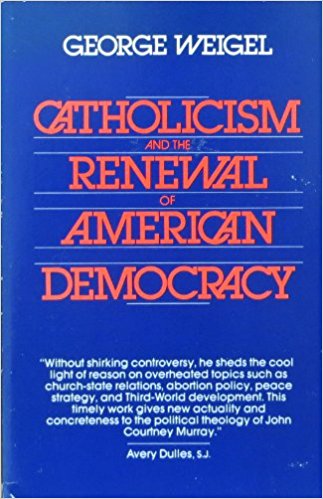
|
Catholicism and the Renewal of American Democracy (1989)
Taking his cue from Richard J. Neuhaus's work, Weigel offers a conservative Catholic critique of the problems of Church and state in America. Well versed in American political theory as well as Catholic tradition, Weigel--author of Tranquillitas Ordinis ( LJ 2/15/87), a study of Catholic teaching on war and peace from a conservative perspective--offers a well-conceived right-of-center argument for a "civil public square" that recognizes the role of religion in American democracy but does not seek to impose one set of beliefs on everyone. Included are essays on major public policy issues, such as war and abortion. Overall, the book is a hard-hitting critique that is accessible to the general reader. -- Library Journal
|
|
|
Tranquillitas Ordinis: The Present Failure and Future Promise of American Catholic Thought on War and Peace (1987)
n recent years, Roman Catholic bishops and activists have been highly visible in the public debate over issues such as nuclear arms control and U.S. policy in Central America. Until now, however, the evolution of American Catholic thought on these questions has received little attention. This book is the first comprehensive critical analysis of American Catholic thought on war and peace. The author's purpose is to evaluate the post-Vatican II transformation of the Church's approach to war/peace issues and to point a wiser direction for its future development. The book begins with a survey of American Catholicism's rich and sophisticated heritage of moral reasoning on war, peace, and political community. In a major reinterpretation of American Catholic history, Weigel shows how the American Bishops' development of a theology of democracy in the nineteenth and twentieth
centuries enriched the Church's classic understanding of peace as political community. Weigel thus challenges the now-prominent idea that the U.S. Catholic bishops were not seriously involved in the war-peace debate until the last decade. A highlight of the book is its detailed intellectual portrait of John Courtney Murray, S.J., whom Weigel calls the finest political theorist ever produced by the American Church. Weigel then demonstrates how, over the past generation, American Catholic intellectuals and publicists began to abandon their heritage, and thereby impoverished the theological and political argument over war and peace, security and freedom. The book analyzes the ideas of seven key figures in the transformation of the American Catholic war/peace debate--Dorothy Day, Gordon Zahn, Thomas Merton, Daniel and Philip Berrigan, James Douglass, and J. Bryan Hehir--and critically explores the U.S. bishops' recent involvement with nuclear and Central American policy. Recovering and developing the classic American Catholic heritage, Weigel argues, is essential to creating a wiser theology and politics whose concern for both peace and freedom challenges realists and idealists alike. Reviews
|
| Thomas Woods | |
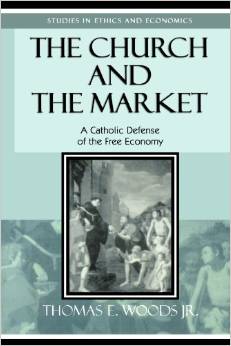
|
The Church and the Market: A Catholic Defense of the Free Economy In The Church and the Market: A Catholic Defense of the Free Economy, Thomas E. Woods Jr. makes a vigorous argument in favor of the market economy from a Catholic perspective. Filling a lapse in the debate on the role of religious thought in economic theory, Woods's uncompromising position, informed by the history of Catholic economic thought, shows that the long-seen contradiction between Catholic faith and support for the market economy does not exist. With attention to detail on almost all aspects of the free market, from the Federal Reserve System and inflation to antitrust legislation and labor issues, this book provides essential background for anyone interested in balancing issues of social conscience with modern economic principles.
Related
Reviews
|
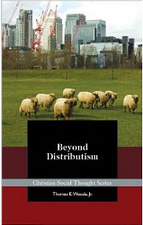
|
Beyond Distributism Troubled by rampant injustice and inequality, many conscientious Christians advocate radical economic reforms. Distributism, a program that traces its popularity to Catholic writers Hilaire Belloc and G.K. Chesterton, promotes the widespread ownership of property by tempering the market with guilds or similar associations. Thomas Woods, drawing on a wealth of historical evidence and informed by Catholic social teaching and economic insight, argues that the distributist case is severely flawed. By its nature, distributism must invoke the power of the state, a dangerous move that ultimately undermines its own objectives. Economic freedom in a market system, Woods advises, is a context more conducive to justice and human flourishing.
Reviews |

